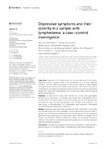Mostrar o rexistro simple do ítem
Depressive symptoms and their severity in a sample with lymphedema: a case-control investigation
| dc.contributor.author | Monteiro, Ana Júlia | |
| dc.contributor.author | Labra, Carmen de | |
| dc.contributor.author | Losa-Iglesias, Marta Elena | |
| dc.contributor.author | Dias, Adriano | |
| dc.contributor.author | Becerro-de-Bengoa-Vallejo, Ricardo | |
| dc.contributor.author | Silva-Migueis, Helena | |
| dc.contributor.author | Cardoso, Paola | |
| dc.contributor.author | López-López, Daniel | |
| dc.contributor.author | Gómez-Salgado, Juan | |
| dc.date.accessioned | 2023-11-06T12:40:59Z | |
| dc.date.available | 2023-11-06T12:40:59Z | |
| dc.date.issued | 2023-07-05 | |
| dc.identifier.citation | Monteiro AJ, de Labra C, Losa-Iglesias ME, Dias A, Becerro-de-Bengoa-Vallejo R, Silva-Migueis H, Cardoso P, López-López D, Gómez-Salgado J. Depressive symptoms and their severity in a sample with lymphedema: a case-control investigation. Front Psychiatry. 2023 Jul 5;14:1202940. | es_ES |
| dc.identifier.issn | 1664-0640 | |
| dc.identifier.uri | http://hdl.handle.net/2183/34051 | |
| dc.description.abstract | [Abstract] Objectives: Depression is a condition that can be associated with other illnesses, especially chronic illnesses. Lower limb lymphedema is a chronic, disabling condition that can affect the quality of life and be related to psychological and psychosocial factors that interfere with people's lives. This study aims to characterize and analyze the depressive symptoms and their severity reported by people with lower limb lymphedema and compare them with a matched group without lymphedema. Methods: A case-control study was carried out (n = 80) with participants divided into a case group (40 people with lower limb lymphedema) and a control group (40 people without lower limb lymphedema). Both groups were anthropometrically, sociodemographically, and clinically characterized. In the case group, a characterization of lymphedema was performed. Participants completed the Beck Depression Inventory-II. Results: Individuals with lower limb lymphedema have higher BDI-II scores than the matched group without lymphedema. Somatic depressive symptoms were, in general, the most reported and the ones with the highest scores. The depressive symptoms most reported by the case group were tiredness or fatigue, loss of energy, and changes in sleeping. Tiredness or fatigue, loss of energy, and loss of interest in sex were the most severe depressive symptoms reported by individuals with lower limb lymphedema. Conclusion: Considering the apparent tendency to depression, greater attention should be given to the mental health of people with lower limb lymphedema. | es_ES |
| dc.language.iso | eng | es_ES |
| dc.publisher | Frontiers | es_ES |
| dc.relation.uri | https://doi.org/10.3389/fpsyt.2023.1202940 | es_ES |
| dc.rights | Atribución 3.0 España | es_ES |
| dc.rights.uri | http://creativecommons.org/licenses/by/3.0/es/ | * |
| dc.subject | Beck depression inventory | es_ES |
| dc.subject | Depression | es_ES |
| dc.subject | Depressive disorder | es_ES |
| dc.subject | Lower limb lymphedema | es_ES |
| dc.subject | Mental health | es_ES |
| dc.subject | Somatic symptom | es_ES |
| dc.title | Depressive symptoms and their severity in a sample with lymphedema: a case-control investigation | es_ES |
| dc.type | info:eu-repo/semantics/article | es_ES |
| dc.rights.access | info:eu-repo/semantics/openAccess | es_ES |
| UDC.journalTitle | Frontiers in Psychiatry | es_ES |
| UDC.volume | 14 | es_ES |
Ficheiros no ítem
Este ítem aparece na(s) seguinte(s) colección(s)
-
GI-NEURO - Artigos [165]






